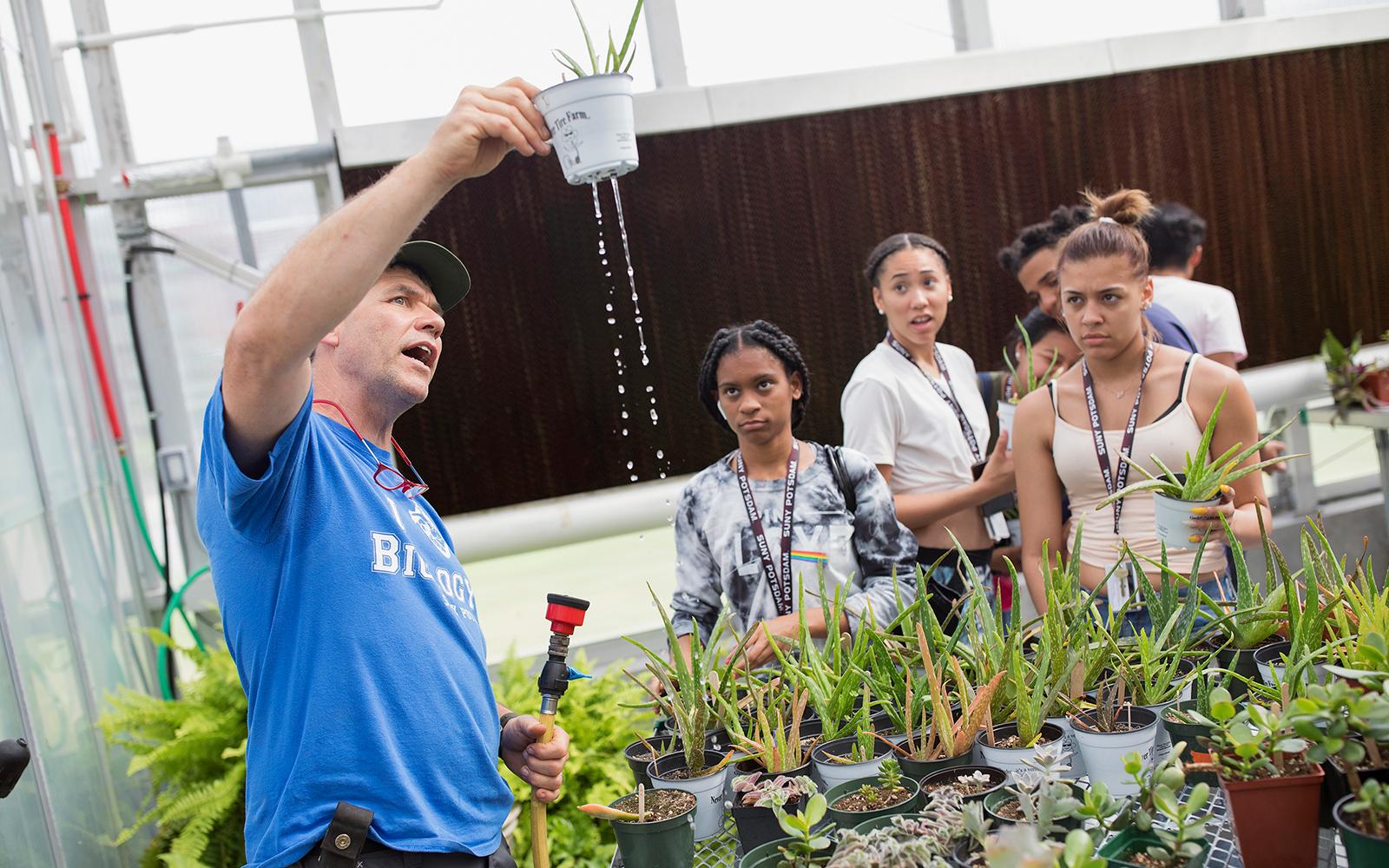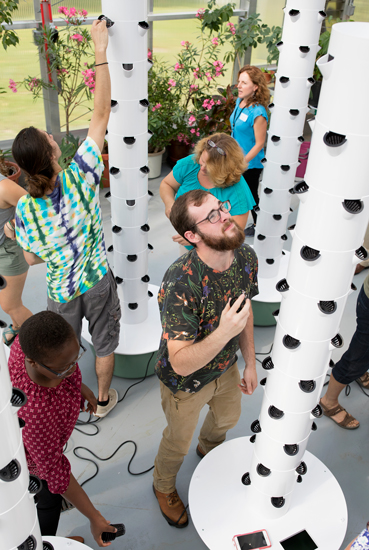In the same way that vertical aeroponic Tower Gardens allow plants to quickly grow under a series of LED lights, so too have the partnerships grown between SUNY Potsdam and the community over the past decade.
Through generous grant funding from the Alcoa Foundation, SUNY Potsdam’s Wagner Institute for Sustainability and Ecological Research (WISER Center) has continued to make an impact in the region—leading to educational workshops on campus, and allowing the College to supply 11 local schools with more than a dozen Tower Gardens at no cost.
“We’re really trying to get this curriculum into as many hands as possible because of the promise that it’s shown with the learners,” said Ray Bowdish, a university instructional specialist in the Department of Biology and WISER Center coordinator at SUNY Potsdam.

Ray Bowdish, left, leads a workshop in the WISER Greenhouse.
Bowdish has been the linchpin of success for the WISER Center, forming strong connections with community partners, and getting dynamic learning tools into the hands of elementary students around the North Country. First, he established a relationship with Stephen Ritz from the Green Bronx Machine—an organization that has created an extensive curriculum focused on urban agriculture built around the Tower Gardens. Working with elementary students at CS 55 in the Bronx, Ritz created a hands-on program focused on having students grow their own food and learn the nuances of aeroponic growing. In 2017, Ritz visited SUNY Potsdam to share his passion with Bowdish and students at the College.
“Stephen Ritz has been a great collaborator. There’s a real emphasis on applied learning in the curriculum. Tower Gardens are great because there’s lots of math that’s taught, as well as nutrition, and there’s a short growing cycle that produces quality food. You can tie it into history, literature, you name it, because it’s part of agriculture, and agriculture is right at the heart of humanity,” said Bowdish. “There are a lot of moving parts here, but at the end of the day, we’re all interested in the same thing: using food production as a teaching tool, or hook into learning.”
The Alcoa Foundation has provided three generous rounds of grant funding for the ongoing efforts at the WISER Center starting with $150,000 in 2016, $39,000 in 2019, and then another $50,000 in 2020. The funding has  allowed the College to purchase beekeeping supplies for the apiary, and Tower Gardens for the WISER Greenhouses and 11 area schools. The grants have also helped the College provide educational workshops for the community on issues surrounding food insecurity, improving biodiversity, and reducing the rate of climate change.
allowed the College to purchase beekeeping supplies for the apiary, and Tower Gardens for the WISER Greenhouses and 11 area schools. The grants have also helped the College provide educational workshops for the community on issues surrounding food insecurity, improving biodiversity, and reducing the rate of climate change.
“Alcoa has been a fantastic partner. I can’t stress that enough. They believe in the mission. Even though we’re a college, we’re trying to engage young learners. We know that if young people eat food that they grow, they’re more likely to try new things, and they often adopt healthier diets at a young age,” Bowdish said. “The goal for me, and our students here, is to be a support team for these area schools. So, we’ve done a few school visitations at Salmon River, Norwood-Norfolk and Canton. Usually, I go with SUNY Potsdam WISER Center interns, and we interact with the classrooms or the clubs, like Canton’s Green Team.”
This fall, the community partnerships have expanded to include the Riverview Correctional Facility in Ogdensburg, where SUNY Potsdam already runs the Potsdam@RCF program—a unique program where incarcerated individuals can complete a Bachelor of Arts degree in sociology as they serve their time. Now, SUNY Potsdam is helping to improve its horticultural program by providing the prison with five new Tower Gardens. Last spring, Bowdish hosted an Escape from Winter event in the WISER Center, for local educators and several employees from the Riverview Correctional Facility. In turn, Bowdish was invited to RCF to visit their greenhouse and observe their horticultural program. “That was an eye-opener. I was blown away by their educational facilities and blown away by how much food they produce on their grounds in the summer. It’s one of the more successful avenues of getting folks rehabilitated,” said Bowdish.
Robert Brabant, deputy superintendent for program services at Riverview Correctional Facility, recently visited SUNY Potsdam where Bowdish presented him and his team with five Tower Gardens that will be incorporated in the prison’s vocational program in horticulture. “This is going to be a great program,” said Brabant. “Last year we donated over 20,000 pounds of food to local food banks in the area. With the Tower Gardens, we will be able to continue with different products through the winter now, and continue to donate to food banks.”
Because of the compact, vertical design of the Tower Gardens, Brabant sees the benefit of the Tower Gardens in more concentrated prisons downstate. “The nice thing about the Tower Gardens is that they have a small footprint. I see this possibly expanding to other correctional facilities, and hopefully, due to their small footprint they would be very functional in larger heavily populated cities,” he said.
During the visit, Bowdish showed them how to construct the vertical gardens, and they discussed the safety modifications necessary within a prison setting. With five towers that include seven sections each, the incarcerated individuals will be able to grow 28 plants per tower at a given time. “The Tower Gardens will be housed in their greenhouse, and they’ll have supplemental lights, like we do here at SUNY Potsdam, so it’s a smaller scale but mimicking what we do. They’re really interested in this because they can have more year-round food production for local food banks,” said Bowdish.
Back at SUNY Potsdam, Melody Rosario ’23, a student in the College’s criminal justice program, will be completing an internship with Bowdish this semester, using Tower Gardens to emulate the hands-on experiences of the students at RCF. “Melody will be able to go through all the steps that the prison will go through with their curriculum. we’ll be in close contact with RCF. She’s also going to be doing research into other prison programs that are trying to use food production, plants, or horticulture as part of their rehabilitation process,” he said.
The Tower Gardens have also been a valuable tool for students in the Department of Teacher Education. Dr. Marta Albert, an associate professor at SUNY Potsdam, has been actively involved with initiatives at the WISER Center as she introduces her students to aeroponic growing—something they could likely see in the classroom as they start their student teaching. This semester, 17 students are enrolled in her Integrated Literacy class (EDUC 407), a course that utilizes a Tower Garden as a teaching tool, right inside her Satterlee Hall classroom.
“A central course project is developing a curriculum using children's literature from a variety of genres to support science and social studies concept learning. The Tower Garden will bring things together uniquely. Hands-on use of a Tower Garden allows us to bring science (and science teaching) to life,” Albert explained. “We will pose and explore questions about food systems, history, culture, nutrition, and more -- and we'll experience the ups and downs of food production through the microcosm of our 'farm in the classroom.' Literacy practices cut through all our work, from reading to figuring out how the Tower Garden operates and how to grow the plants we eventually hope to harvest and eat.”
Albert has been bringing her students to the WISER Center for years, and working with Bowdish to provide an interdisciplinary approach to learning for her students. The WISER Center is comprised of three greenhouse zones, one of which houses several rows of Tower Gardens used by SUNY Potsdam students throughout the semester. The WISER Center was completed in 2016 after a generous donation by alumnus Robert (Bob) Wagner ’75 and his wife Wendy, and has been a vibrant source of applied learning opportunities on campus ever since.
“In terms of recruitment and retention, we see a lot of tours of people coming through campus and they are really impressed with the greenhouses, and they’re excited about things like the Tower Gardens,” Bowdish said. “I’ve had several students who have said that if it wasn’t for the WISER Center and the active learning, they may not have stayed in school, or at least at SUNY Potsdam.”
Article by Jason Hunter
